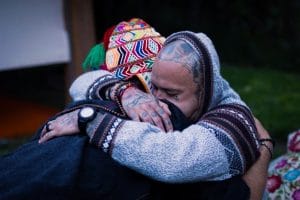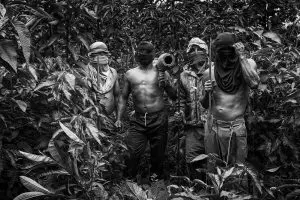This story is part of a series with Girls Who Say Fuck on psychedelics, sexuality, and intimacy.
To have a psychedelic experience is to have a queer experience. I’m not saying this to be provocative, or even controversial. And this isn’t to say psychedelics are only for the queer community, or that if you’re straight, you won’t have the full experience. But as the acclaimed psychedelic writer Bett Williams so aptly puts it: “psychedelics are queer, just saying.”
Both queerness and psychedelics extend beyond the limitations of society’s mundane expectations, Williams, now a speaker on the psychedelic circuit, explains. Breaking out of the gender binary or the boundaries of the quotidien mind, queerness and psychedelics alike offer the experience of shapeshifting—of re-envisioning what you can be.
And the queer community, in particular, is good at that. “They had to become something else within their lifetime,” Williams tells DB. “They had to enact that transformation within their psyche.” And simultaneously, they’ve had to foray into something that’s culturally taboo—just as psychedelics, themselves, remain taboo under the law.
As Williams says, “being queer means you can become everything,” and yes, she added, psychedelics, too, “offer a kind of everythingness.”

A writer, former mushroom cultivator, and trailblazer in the niche that is queer psychedelia, I half-expect Williams to relay a linear story about psychedelics and the evolution of own her sexuality. But it turns out, her psychedelic path had its own twists and turns, ups and downs, offshoots, and the like. The psychedelic experience is anything but linear, just saying.
“The first time I did shrooms was right as I was coming out as a lesbian,” recounts Williams, who recently penned a memoir—“The Wild Kindness”—about cultivating psilocybin fungi in New Mexico. At the age of 15, Williams came upon a “goth girl who showed up out of nowhere” and who was looking for someone she liked enough to trip with.
“We went to this beautiful broken down mansion in Montecito, California, and kissed like Victorian ladies,” Williams describes. “It was definitely an affirming experience for my identity.” And, as she wrote in her memoir, it was “everything one would want from a first-time experience.”

Williams’ sexuality was just one element upon which she built her sacred bond with psilocybin. She spent the next 15 years after that first mushroom experience staying away from them, although nonetheless growing into and grounding in her queer identity.
How to Grow Shrooms Bundle
Take Both of Our Courses and Save $90!
“Being queer is a kind of shamanism,” Williams says during our interview. “Sexuality has always been a ceremonial medicine in any old way.” So while her initial mushroom experience was associated with a positive sexual experience, in broader terms, it was also an exercise in self-acceptance—in fostering a spiritual bond with the self. And that came into play the very next day, in a sobering clash with reality.
On a trip to a juvenile detention center with a teen outreach program Williams was part of, she excitedly shared with her 28-year-old counselor with whom she’d been having an affair that she had done mushrooms the previous night. However, since this was a “drug-free” program, the counselor fired Williams on the spot. “I was crying, thinking everything in my life was over,” she recalled. “It broke my heart, and I had a block about psychedelics.”
But in retrospect, she added, the mushrooms had led her to the right path, after all. “[Because] it offended my predator so much, enough to scream at me that I was fired, I believe that the mushrooms were guiding me to my true self by showing up at that time, to get away from that adult.”

It took another 15 years for Williams to return to psilocybin. During a difficult breakup, she says she felt called back to mushrooms. “I found myself asking a friend, ‘Do you have any?’ and I took a small amount,” she said, and then committed to doing them every three weeks by herself. She developed a simple, grounded practice of sitting by the pond, and listening to the mushrooms. “That’s my thing,” she said. “The teacher is the mushroom.”
Today, Williams, herself, holds space for those in her community—many of them queer—to come to the mushrooms for healing, like she herself did upon rekindling her bond with them.
“If you were to pick a word, I would say my practice would be devotional,” she says. And although she says there is no “right way” to do psychedelics, Williams does have a ritual around her own practice. She begins with a taste of Syrian rue—a psychedelic vine native to the Middle East—to help her tune in with those around her, before journeying with psilocybin.
Then, with the mushrooms as the ultimate guide, she describes, “we have to sit there and ask the plant, ‘Hey, what do you think?'” But she cautions to never enter a psychedelic experience with a singular expectation, such as figuring out your sexuality or healing your depression. Sure, psychedelics can help, but there’s so much that could be unexpected that happens, too. “It’s never just the mushroom,” says Williams. “It’s a mixture of many different elements. There’s always another thing. It has to do with the arrangement of your own spiritual world.”
And so that’s what people explore when they come to Williams and the mushrooms. “People just come stumbling into the mushrooms with such a need to heal,” she says. “They come to the mushrooms to cry over their exes, my goodness. And again, that’s a kind of queerness: When my straight friends come to cry over an ex who happens to be male, they’re entering into a queer space to do so.”

Using her own queerness as a lens through which to understand the psychedelic experience, she says that mushrooms offer “an everythingness to lean on, an everythingness of the world.” If you’re fixated on a dragonfly while you’re tripping, she says, that dragonfly is who you are becoming in that moment. “That’s what’s healing you from your heartbreak with your ex-boyfriend,” she says. “All the things of the world, that’s what’s going to be the medicine.” It’s the mushrooms, but never just the mushrooms.
In this way, queerness becomes a means of explaining the psychedelic experience. “I don’t even think that a straight person would have a different experience necessarily,” Williams says. “I think that’s who we are; whether we identify as queer or not, it feels true to me—that when we are in our psychedelic selves, we are anything and everything.”
As they say in Alcoholics Anonymous, “you gotta pick a higher power,” Williams says. “It’s not the psilocybin, it’s the higher-order that you have to acknowledge exists that helps you”
In surrendering to that higher power, it’s important not to chase anything, not to try and make anything happen during your trip. “Hold onto your own self, get centered, and tune into what Terence McKenna referred to as ‘the voice of the other.’ That’s the entity of the mushroom.” And in doing that, you just may come back to yourself—in your queerness, your sexuality, your heartbreak, and your joy.
Madison Margolin is DoubleBlind’s Co-founder and Managing Editor.

DoubleBlind is a trusted resource for news, evidence-based education, and reporting on psychedelics. We work with leading medical professionals, scientific researchers, journalists, mycologists, indigenous stewards, and cultural pioneers. Read about our editorial policy and fact-checking process here.

DoubleBlind Magazine does not encourage or condone any illegal activities, including but not limited to the use of illegal substances. We do not provide mental health, clinical, or medical services. We are not a substitute for medical, psychological, or psychiatric diagnosis, treatment, or advice. If you are in a crisis or if you or any other person may be in danger or experiencing a mental health emergency, immediately call 911 or your local emergency resources. If you are considering suicide, please call 988 to connect with the National Suicide Prevention Lifeline.



